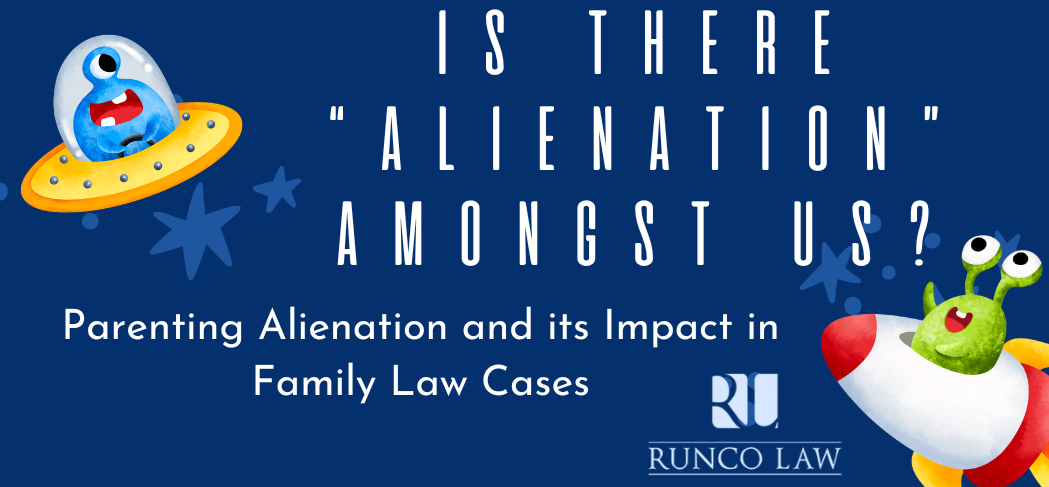In recent communications I have had with family law lawyer colleagues on social media, one of the issues that has come up is the reference to parental alienation in family law cases: how often it comes up, when it comes up, how judges treat, etc. It is one of those terms that is used so often, and with such abandon, that it’s hard to define what exactly it is, and what it is isn’t.
Over the last few weeks, there has been a movement by some family law professionals to eradicate its use in family law cases. For some, it can be used as a sword, to diminish or harm a parent who is trying her best to parent children who may not want to see the other parent, usually for legitimate purposes. For others, it is a dangerous shield, used by abusive and unbalanced parents to preclude their children from having a meaningful relationship with the non-custodial parent (as the terms were recently known).
My personal opinion: I am not a fan of banning things. I would rather have proper understanding of the concept and where it is useful, to make use of it, whether to explain my client’s actions, or critique those of the opposing party.
This blog will not be a deep dive into the concept of parental alienation. It’s a simple blog, and not a peer-reviewed academic paper, with quoted sources and significant research behind it. Rather, as the term “parental alienation” is very often used in family law cases (in and out of court), I want to introduce the topic, describe what it means, when it is raised as a concern (as a sword, a shield, or both), and provide anecdotal recent case law, to show how some judges have treated it. As with my other blogs, the opinions offered are solely my own, from my own legal experiences of what I have seen as a family law lawyer since 1994.
What Is Parental Alienation?
Although there is no one clear definition of parental alienation, most lawyers and legal professionals would accept that parental alienation occurs when one parent intentionally behaves in such a manner so as to cause their child or children to not want to have a meaningful relationship with the other parent. This can be done though the offending parent’s “active” words, actions, and behaviour – ones that encourages a child to treat the other parent with fear, disdain, and/or contempt. Alternatively, it can happen when the offending parent passively (yet intentionally) permits, allows or even encourages the child to see and/or treat the other parent in such a manner.
How to Spot Parental Alienation
Because there is no one definition, what the literature suggests, as referenced in the cases that address accusations of parental alienation (which will discussed in a moment) is to look for the “warning signs,” as identified by Dr. Barbara-Jo Fidler, a highly regarded authority in this field, of activity that could constitute parental alienation (this list is not exhaustive):
- The child views a parent in a one-sided manner – all good or all bad – i.e. one parent is idealized, the other parent is devalued
- The child engages in a campaign of hatred towards the one parent where the child viciously vilifies that parent
- The child finds justification for such hatred towards the parent for trivial, false and irrational reasons
- The child’s reaction and perceptions are either unjustified or disproportionate to the parent’s behaviours
- The child does not exhibit any guilt or is ambivalent regarding their treatment of the parent
- The child exhibits a strong, but not necessarily a healthy, psychological bond with the alienating parenting
- The child denies any hope for reconciliation, or lacks any acknowledgment of a desire for reconciliation
When to Address Parental Alienation and What to Do About It
Once a client sees any of the behaviours above, or more likely, a cluster of such behaviours, it is important that the matter is identified right away, so that the issue can be addressed quickly and in the open. My experience is that the “offending parent” (for lack of a better term) will usually deny any such allegations. They may be completely correct in doing so – just because someone makes the allegation does not make it so. Whoever alleges it should be able to objectively establish the criteria and suggest that the case has the appearance of parental alienation. The party alleging it needs to have objective third-party evidence from trained professionals to support the claim, and even then such professionals will be subject to extensive cross examination of their conclusions when the matter proceeds to court. As I have said already, clients should not think that they can just make the allegation and then not be able to objectively prove it.
But to be clear, if you genuinely believe your case has the signs of parental alienation, it is critical to make the assertion early on, so that such behaviour, whether it is intentional or unintentional, is stopped as early as possible. Once identified, the parties should engage the services of trained professionals – no, not family lawyers or judges – but those mental health professionals who have experience in dealing with such conflict between parties. Where resources allow for it, the parties should engage a therapist to help the child or children address whatever they are going through. It should go without saying that the therapist the child or children uses is not one that either of the parents use for their own mental health issues (sadly, I saw this proposition put forward by a lawyer, to save money on therapy costs).
Having said that though, it is important to have the child be represented by either a lawyer from the Office of the Children’s Lawyer, with or without a social worker/clinician to assist with presenting the child’s views, preferences and circumstances to the court, so to not involve the child directly into the fight between the parents.
How Have Courts Treated Parental Alienation Claims?
It is widely accepted that claims of parental alienation are rampant in family law cases. As mentioned above, there is a movement afoot to ban people from doing so. This may be motivated for other reasons, as more women than men face the allegations of parental alienation. But I disagree with the idea of precluding it. It can equally apply to either parent; the fact that more women face the allegations is not a basis to prevent clients from legitimately trying to establish the claim. Rather, when it is not proven, there should be a strong message sent to the those who make patently false allegations of parental alienation that such behaviour will not be tolerated by the courts. Serious cost consequences and/or reducing parenting times with the subject children would be a good start to deter such tactics.
From my experience, especially during the Covid 19 pandemic and afterwards, the concept of parental alienation has been the “boogeyman” term in family law, so often used whenever one parent feels their parenting role is being diminished by the other parent. But please understand that just because one party claims parental alienation does not mean that parental alienation has taken place. The party who makes the allegation of same bears the onus of proving that it exists. It’s not the other way around. As stated above, if one alleges it, but then cannot make out even a prima facie case of it, the decision to use the term will backfire terribly for that party. Clients or their lawyers who simply decide to “throw in” the allegation and then see what sticks will find themselves having their case vigourously scrutinized. The court takes allegations of parental alienation seriously, and if upon inspection the facts do not bear out even a simple case of it, a client should expect to see their credibility likely damaged beyond repair going forward.
However, if it is established on a prima facie basis, the court will then treat the allegations of parental alienation as they would with every other parenting case – they will see how it impacts the best interest of the child. Whether the case is dealt with through the Divorce Act or the Children’s Law Reform Act, a judge’s task is to determine what is and is not in the best interests of the child. Full stop. It is therefore easy to understand that should parental alienation be established, it will not be in a child’s best interest to allow it to continue. As judges have said, a parent’s consistent undermining of the relationship between the child and the other parent is a form of emotional abuse.
What does this mean for the “perpetrator” of parental alienation? If it is established at a motion or trial that there has been parental alienation, a judge has a wide variety of ways to address the matter, considering its impact on the child, including:
- ordering reconciliation therapy
- granting more parenting time to the “wronged parent,” or
- changing the residency and decision-making responsibility for the child in favour of the “wronged parent.”
A word of caution, though. The judge will decide what is best for the child, taking into consideration the finding of parental alienation, along with other factors to help the court establish best interests as provided for by the applicable legislation. Factors such as the status quo, the age of the children, the views and preferences of the children, their cultural background, plans for the children’s future, and instances of domestic violence between the parents (to name some, but not all factors), must be considered by the judge and balanced as a whole to help them decide what is best for a child. I do not want anyone to think that a finding of parental alienation will automatically equate to a favourable decision for the “wronged parent.” It is one of the factors that will be given consideration, but it’s fair to say that it could be a big factor.
Conclusion
As common as the term parental alienation is now used in family law litigation, it must be taken seriously by all involved. The parties’ ultimate agreement, or the court’s ultimate order, as to what is best for a child is not a game to be played. A court will usually see through an attempt by one party to hurt the other party by (a) making false allegations of alienation, or (b) being indifferent to the fact that they are actually alienating the other parent.
I have seen many of the actions/inactions of parties that fall along the “spectrum of alienation” – starting on one end with a completely bogus allegation, to a mere passive approach of one parent to permit/allow a child to dictate when they see the other parent, to full-blown active and aggressive steps by one parent to cut the other parent out of the child’s life. And rest assured, the courts have seen more of these scenarios than I have. And they are not impressed at al.
As such, please heed this warning: if a judge can accept the fact that one parent hates the other parent more so than they love their child, it will not be big stretch to then believe that such a parent is not acting in the child’s best interests. This is not what you want a judge to come to a conclusion about you. And, at the end of a family law dispute, what is in best interests of a child, and what is not, is all that matters.

